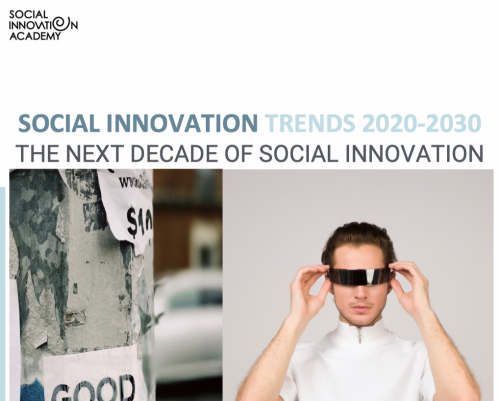Full Text Sharing

http://www.socialinnovationacademy.eu/social-innovation-trends-2020-2030/
INTRO
From the beginning of the 21st century, social innovation has played a key role in both academic debates and the agenda of the international political community. It was against the backdrop of the 2008 economic and financial crisis that social innovation began to gain momentum as a practical solution for tackling social, political, economic and environmental challenges such as poverty, ageing or migration, among others. It was within this context that social innovation began to receive growing attention as a promising concept to be researched, understood, defined and conceptualised. Its classification is wide and complex and includes different approaches from which the concept can be observed.
This myriad of meanings of social innovation is evident within the diverse initiatives and projects that can be found later in this document. Moving beyond its conceptual diversity, however, all of the definitions share a common recognition that social innovations should be: • Open rather than closed when it comes to knowledge-sharing and the ownership of knowledge • Multi-disciplinary and more integrated with problem solving than the single-department or single-profession solutions of the past • Participative and empowering of citizens and users • Tailored rather than mass-produced • Demand-led rather than supply-driven.
At Social Innovation Academy we define social innovation as: ‘Any innovation that is social in its end or in its means, or simply any working innovative solution to help address a pressing societal challenge.’ Based on the positive momentum experienced by social innovation during the first two decades of the 21st century, it can be stated that globally, an ecosystem for social innovation has been created that reflects the number, variety and richness of the initiatives, projects, platforms, actors and entities involved. From poverty to education, health to the environment, we can point to many innovations around the world that, although characterised as socially innovative, actually have minimal impact. The Social Innovation field is thus lacking serious and sound initiatives focused on systemic change. As such, there still is a long way to go if we are to provide effective responses to the big challenges facing our societies. What does this report contain? Social Innovation Academy is a project co-funded by the Erasmus Plus Programme. Social Innovation Academy aims to develop the tested concept of the Social Innovation Academy to a whole new level of content, delivery and reach. Social Innovation Academy aims to develop tested methodologies to train in social innovation, co-create learning content and build a sound community of experts, practitioners and citizens interested in social innovation.
The objective of this document is to design and prepare a quick and agile text from which we can obtain an overview of the future trends of social innovation worldwide. It does not claim to be a research study for the academic community or a policy paper for policy-makers. The document was conceived for the purpose of offering the general public a useful and first-hand document capable of serving as a guide for those interested in being introduced to the Social Innovation world. The report is oriented towards a comprehensive understanding of social innovation that is not limited to single areas. In order to apply this concept, the project team used three different sources of information: • A selection of the key literature on Social Innovation. • An analysis of three websites of reference in the Social Innovation field. • An analysis of the mapping of Social Innovation competitions, awards and prizes worldwide, emphasising the most significant ones. The Social Innovation Trends Report is composed of five sections. The first section contains a brief description of six key documents on social innovation. The second section comprises an analysis of three websites of reference (SIC, SIX Wayfinder, DSI4EU) in the field of Social Innovation, while the third section contains an analysis of the challenge competitions and prizes promoted worldwide.
About the Academy:
http://www.socialinnovationacademy.eu/welcome-social-innovation-academy/










Add new comment